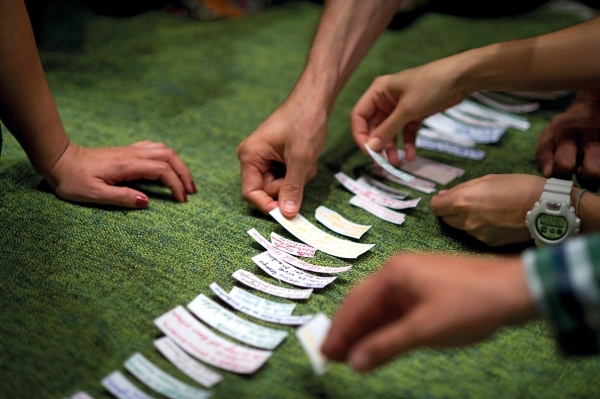How would you react if somebody told you that you could expand your vocabulary in a foreign language with up to 950 words a day? You would probably think he's
crazy, wouldn't you? Of course you would! We were taught since we were little that the learning must always be difficult, that the repetitive exercise is the secret to proper knowledge. It turns
out, however, that there's a pedagogical approach which promotes the foreign language acquirement beyond our expectations. The so called Suggestopedia involves none of the traditional learning
methods and is in fact their opposite – instead of putting ourselves under pressure, this alternative suggests that we lay back, relax and let things happen naturally. Exactly like when we were
children…What's more logical than that?! The children are the ones that learn their first language better than anybody else. Let's travel back to childhood and make the foreign languages our own.
Ladies and gentlemen, it's time for Suggestopedia!
Behind every brilliant idea stands a brilliant man. Therefore , before we take a closer look at this unique method and find out how to actually put it into
practice, we'll first introduce its creator – Prof. Georgi Lozanov. We honor this brilliant scientific mind that passed away a year ago, disappointed by the lack of appreciation in his
homeland.

We all know that our brain is a very complex organ and we haven't fully unleashed its true potential yet. Regardless how much information it assimilates during the
day, we still use only a little percentage of our brain. This subject has been the area of interest along the career path of prof. Lozanov. Before focusing his efforts on researching the impact of
suggestion in the studying process, the scientist already has an opinion on this subject, since he is the director of the psychiatric hospital in Kurilo and one of the pioneers in psychotherapy in
Bulgaria.
Thanks to his knowledge in the field of integral psychotherapy and hypnosis, Lozanov has successfully cured hundreds of drug-resistant patients in the last 10
years. In 1965 he succeeds in performing the first painless surgery, an inguinal hernia operation without anesthesia, only with the help of hypnotherapy. The surgical manipulation has been
documented as a video file back then and later became a major event amongst the medical society.
Hypnotised souls
It is important to note that the suggestive methods used by suggestopedia, the phenomenon we're about to introduce, is not to be confused with hypnosis! Despite the
remarkable medical results due to this method of treatment, Prof. Lozanov himself stopped practicing hypnotherapy - for moral reasons and because it weakens the resistance of the human body to
external influence if used for too long on a patient. That's why the doctor starts looking for another ways to cure his patients and finds out that the same
results can be accomplished only with the help of suggestion.The suggestion doesn't put the will to sleep, it's an universal communication factor that takes part in every moment of our lives,
although not always intentionally.
If you ever wonder why the children have favourite teachers and manage to memorize faster, understand better and behave in their classes, while they simply drive other
teachers crazy? The answer is suggestion. It turns out, the knowledge on the subject doesn't necessarily guarantee the teachers' success, because the first impression they leave is clearly
personal. The way they smile, dress, move, walk, talk and treat their students has a crucial impact, although their speech is often considered to be be the most important quality. The features
mentioned above are only a small part of the so called basic signals that cause a certain reaction and lock or unlock the mental skills.
Prof. Lozanov knows exactly how to unlock them. His longtime research is driven by the belief that there's nothing impossible. "I've always thought that we are,
metaphorically, fallen angels, imprisoned gods, hypnotized souls that believe in their mere existence. And put up with it."






